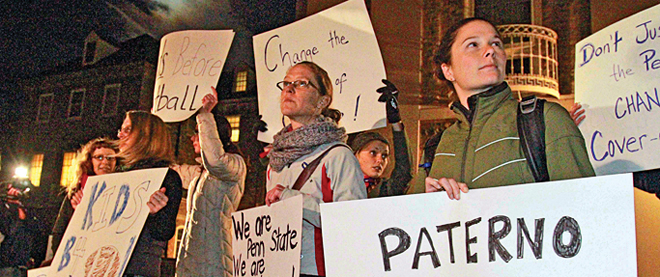This isn’t the way to protect our children
Should we punish Joe Paterno in the 21st century for his retrospective cultural attitudes?
AP Photo/Gene J. Puskar
Share

A virus hits American commanders-in-chief when on aircraft carriers. Think George W. Bush on the USS Abraham Lincoln declaring we “have prevailed” in front of the Mission Accomplished banner. Or the sombre Richard Nixon doing a mini jig of excitement on board the Hornet at the Apollo 11 splashdown. Hard not to compare them unfavourably with Cher on the USS Missouri in thigh-high stockings and biker jacket, utter fabulosity, even though her lyrics, “If I could turn back time,” were nearly as banal as Dubya’s.
For new lows the ribbon goes to President Obama’s Veterans Day remarks on the USS Carl Vinson. The Penn State scandal, said the American President, should lead to “soul- searching” by Americans. “Our first priority,” he said, “is protecting our kids.” As opposed to what: protecting senior citizens, the economy or perhaps the endangered Kretschmarr cave mould beetle? A bit rich, anyway, in a country where over a million of its potential kids per year get deliberately aborted.
Briefly, in case you have been in a coma: legendary (junior grade) Penn State football assistant coach Jerry Sandusky, 67 (there are many “legendary” figures in this story, but as I can’t tell legend from long snapper in American football, I can’t vouch for the designation), has been indicted on 40 charges, all relating to sexual assault on minors. The indictment came via a grand jury convened over years in the absence of the citizen under investigation or proper rules of evidence.
Included are allegations of groping, anal sex in showers and oral sex with young boys met through Sandusky’s program for disadvantaged youths. All very nasty, but unproven before trial, which is already mission unaccomplishable. Prosecutors released the grand jury’s findings of fact to an eager press who advertently misplaced the word “alleged.” Thus the “How many other children could have been sodomized?” reaction of Nancy Grace. I doubt any jury north of Antarctica could try this case fairly.
Two executives at Penn State are charged with perjury and failing to report allegations of child abuse to the police. The graduate assistant who reported a 2002 shower incident to his Penn State superior is now on “indefinite leave.” Legendary coach Joe Paterno, 84, due to retire, has been fired by Penn’s board of trustees together with unlegendary university president Graham Spanier. More alleged victims are coming forward. There is talk of civil suits to be filed on behalf of the victims against the university. Experienced child abuse lawyer Slade McLaughlin is quoted saying lawyers are trolling for clients at the Penn State rallies: “When you’ve got 19, 20 kids coming out, saying ‘he did it, he did it,’ ” explains McLaughlin, “I don’t understand why anyone at Penn State in their right mind would say, ‘Let’s fight this.’ ” Nope, just roll over: if there are funds to be dished out, it’s payday.
Do we want a society in which people who see a crime but don’t report it to the police become criminalized? If you see a mugging and don’t report it immediately to the police you are morally bankrupt but not a criminal. If I tell my boss I saw a fellow employee stealing from the supply cabinet, should I be charged if she doesn’t go to the police? Snitching is the right thing to do in every conceivable sense if you see a child being sodomized, but to create another class of criminals for not snitching doesn’t seem helpful. Such reporting laws are part of what sentencing authority professor Michael O’Hear of the Marquette University law school, in his essay “Perpetual Panic,” refers to as “harmful effects of excessive or misdirected responses” to child sexual abuse. They won’t deter sexual predators, but commit resources to non-productive areas.
Changing emphasis in the culture is another inconvenience. Penn State’s own professor Philip Jenkins, a distinguished historian, in his book Moral Panic: Changing Concepts of the Child Molester in Modern America, details three waves that peaked in approximately 1915, 1950 and 1985 of “wildly exaggerated and wrongly directed” panic over child abusers, with public interest declining during the 1920s and 1960s. In retrospect, say both Jenkins and O’Hear, 1985 was not the peak but the plateau. We are now in the third decade of this hysteria, with new laws proliferating, harsher sentences and witch hunts based on false memory syndrome and the lure of big payoffs.
Sex with children has rightly never been acceptable in modern times, particularly if physical force is involved, but the age of consent has varied considerably and still does in both the U.S. and Europe, from 13 to 18 years old, according to gender or marital status. Paterno, whose only crime appears to be not going to the police, came of age in the locker rooms of the late forties, where sex with a child would be wrong but likely handled inside the university. Should we punish him in the 21st century for his retrospective cultural attitudes? There is a case to be made for a temporal jurisdiction: crimes committed in the cultural framework of another time may not always yield to trials held in new time.
A statute of limitations (currently removed for child abuse) exists because memories fail, hard evidence may be unavailable, guilt or innocence cannot be established confidently. How can you know which of the adults citing incidents 20 years ago are telling the truth? Is the onus to be on the accused to prove his innocence rather than the accuser to prove his case?
Perhaps Cher was wrong. We can turn back time and have: to the hysteria and methods of 17th-century Salem, to Cotton Mather and his “touching tests” for witches. Not a good bargain for justice and no way to protect our children. But we keep singing the same tune and it’s getting louder.